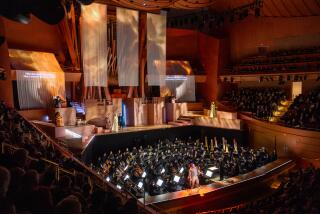TEMIANKA, VIRTUOSI IN ROGER WAGNER TRIBUTE
Something of an identity problem plagued Saturday evening’s concert at Pepperdine University. The program cover promised the California Chamber Virtuosi, but director Henri Temianka went right to the source for his tribute to Roger Wagner, enlisting the Roger Wagner Chamber Chorale.
As Temianka explained at the conclusion of the music-making, Wagner has suffered a palace revolt of sorts in the Los Angeles Master Chorale, an organization that most Angelenos associate with Wagner as clearly as the chorale that bears his name. So Temianka offered the evening as a colleague’s vote of confidence.
The current edition of the 12-voice Chamber Chorale left no doubt about Wagner’s ability to gather talented voices and make them sing effectively together.
Wagner himself took the podium for the second half of the agenda, leading his singers and pianists Albert Dominguez and Michael Zearott in Brahms’ “Liebeslieder” Waltzes, Opus 52 and parts of Opus 65. He saw to it that the English translations came across with optimal clarity and lilt. Fleeting moments of ruffled intonation and imbalance in favor of the tenors did not disturb the graciousness and lyric poise Wagner elicited.
One of the unidentified soloists, however, tacked against the prevailing current of sophistication. The alto entrusted with two of the waltzes produced a seemingly unintentional parody, visually and vocally, of a parlor crooner.
Dominguez and Zearott backed both the sublime and the silly with a finely detailed and balanced account of the four-hand accompaniment. Dominguez and Zearott also closed out the first half, at two pianos, with Milhaud’s breezy “Scaramouche” Suite. The vociferous response to their direct, well-integrated efforts made them repeat the “Brazileira” movement.
Temianka opened the proceedings with a setting of Psalm 92, in Hebrew, that he said Schubert made for a Viennese synagogue. It is a relatively straightforward, homophonic work, although Temianka’s deliberate tempos created a pedestrian effect in the disingenuous outer sections. The middle, more dramatic part, includes a baritone solo, handsomely sung by an again anonymous chorister.
This was paired with Temianka’s arrangement of Shostakovich’s Hebrew Folksongs, Opus 79. Soprano Maurita Philips-Thornburgh, alto Nancy Fontana and tenor Casey Criste produced nicely inflected German, singing with remarkable nuance.
Temianka created a clarinet part from the melodic bits in the piano accompaniment, underlining the ethnic character of Shostakovich’s expressive music. Zearott and clarinetist Yehuda Gilad joined the singers in a rhythmically supple performance apt to both joy and anguish. Here was virtuoso chamber music indeed.
More to Read
The biggest entertainment stories
Get our big stories about Hollywood, film, television, music, arts, culture and more right in your inbox as soon as they publish.
You may occasionally receive promotional content from the Los Angeles Times.










